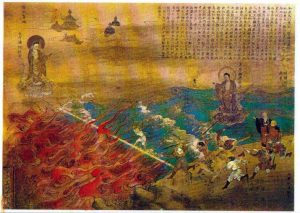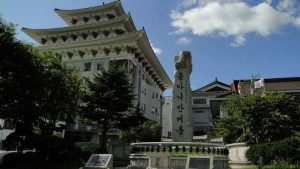
Weakness in pursuing truth and the difficulty of attaining deep faith
At the beginning of his explanation of the Deep Mind, Master Shandao wrote: Secondly, there is the Deep Mind. “Deep Mind” is the mind of deep faith. There are also two kinds.
The first kind of determinant deep faith: We are iniquitous ordinary beings subject to endless rebirth. Since time immemorial, we have died and been reincarnated, without any causal conditions to leave the cycle of rebirth.
The second kind of determinant deep faith: Amitabha Buddha embraces and receives all sentient beings with his 48 vows. Without doubt and anxiety, we are assured of rebirth [in the Pure Land] with recourse to the power of his vows.
The first two kinds of Deep Mind—namely the “determinant deep faith in aptitude [and capacity],” and the “determinant deep faith in the teaching [of deliverance]”—are actually considered to be one but seen from different perspectives. The former is seen from the perspective of sentient beings, while the second is seen from the perspective of Amitabha Buddha.
Having the first kind of determinant faith (as discussed in my last article) means that we deeply believe that ordinary beings are attached to mundane matters and weak in pursuing truth. It follows from this that they likewise have difficulty in attaining faith, particularly faith in the teaching of Amitabha’s deliverance. If we were earnest in pursuing truth, we could more easily establish deep faith in the Buddhist teachings. But we ordinary beings would rather indulge our tastes for drama, conflict, and trivialities. This is one of the main reasons why Pure Land Buddhism is a teaching that is difficult to believe in.
We can draw an analogy from the relationship between patient and doctor. If a person does not believe she is ill, it is pointless to ask her to follow the guidance of a doctor. But if a patient knows she is afflicted with a terminal disease, she will entrust herself fully to the doctor without hesitation. Unfortunately, most sentient beings suffer from wrong view as opposed to right view. They mistake suffering for happiness, impurity for purity, or impermanence for permanence. In this way, we are just like the person who cannot be helped because she does not believe she is ill.
Shakyamuni Buddha tells us we are “patients” afflicted by all kinds of suffering in this defiled world. Moreover, he informs us that we cannot be healed through our own efforts. If we wish to recover our health and experience a state of true happiness, we must entrust ourselves to a doctor.
Shakyamuni Buddha recommends Amitabha Buddha in the Land of Bliss, who is the physician par excellence for all sentient beings. By relying exclusively on his Fundamental Vow, sentient beings can easily be admitted to Amitabha’s Pure Land where they are born into a state of health and happiness, and will naturally experience the speedy attainment of Buddhahood.
Because of his accomplishment of the Fundamental Vow, Amitabha’s vow of deliverance is true
According to the Buddhist teachings, an ordinary being who wishes to become a Buddha must spend many kalpas in the cultivation of virtuous practices, thereby accumulating the causal virtues for achieving Buddhahood. When these causal virtues are perfected, the reward of full and final enlightenment will be realized. This is the general principle of becoming a Buddha.
However, as stated by the first kind of determinant deep faith, a sentient being who deeply believes that she cannot complete the causal virtuous practices in this lifetime has another alternative—to attain assured rebirth in Amitabha’s Pure Land through reliance on Amitabha’s vow of deliverance.
Since Amitabha has accomplished his vows of deliverance, sentient beings can complete the cause of achieving Buddhahood by giving rise to a single thought of faith in his deliverance, and by exclusively reciting Amitabha’s name for the rest of their lives. Thus, they will be received by Amitabha Buddha at their end of their lives and be reborn in his Pure Land.
Upon rebirth in the Land of Bliss, they immediately realize the wonderful rewards in the realm of unconditioned nirvana offered by Amitabha. Obviously, attainment of these supramundane rewards transcends the principle of cause and effect that we experience in our conditioned world. This is yet another reason why ordinary people find it so difficult to understand the Pure Land teachings through the application of worldly knowledge.
Master Yuanzhao said in the Commentary on the Meaning of the Amitabha Sutra, “Regardless of whether we are foolish or wise, renunciant or layman, good or evil, senior or novice practitioner, if we vow to set forth the determinant faith, we can be reborn through ‘ten-recitations’—even if we should find ourselves entangled in offensive karma at the end of our lives. This teaching is extremely difficult to believe. How can a slow-witted ordinary being with karmic attachments, or a foolish butcher of the lowest class, transcend the world to become a Buddha in a single moment [of faith]?”
Extremely difficult to believe, indeed! Nevertheless, our revered teacher Shakyamuni Buddha reminds us that it is so. To attain the second kind of determinant deep faith, it is important to understand that Dharmakara Bodhisattva made his 48 vows and practiced the pure karma in his causal ground for all sentient beings. Now, he is a Buddha called Amitabha who resides in his Pure Land in the West, and delivers all sentient beings who rely upon his Fundamental Vow and exclusively recite his name. According to the Infinite Life Sutra, delivering this difficult-to-believe teaching is the entire reason why Shakyamuni Buddha appeared in our world!
Amitabha’s equal deliverance through his Name
Dharmakara also accomplished the Name that is extoled by all Buddhas of the ten directions. This Name that sentient beings can easily recite is the dharma body of Amitabha Buddha, and takes the form of infinite light. The Name is the tangible form of infinite light, while infinite light is the intangible form of the Name. Both are none other than Amitabha Buddha himself.
Faith and merit-transference (from Amitabha Buddha to iniquitous ordinary beings) are naturally included in the exclusive practice of Name recitation. In addition, the great six-character Name also includes the three criteria for rebirth listed in the Fundamental Vow: faith, aspiration and practice. Thus, when we recite it, rebirth is assured because it is the only practice that perfectly fulfills all the criteria for rebirth without dependence on the calculation and effort (self-power) of sentient beings.
Strictly speaking, instead of saying “we believe,” it is better for Pure Land aspirants to say “we are allowed to believe.” Because of the virtuous roots accumulated in our past lives, we are embraced by Amitabha Buddha, who then “allows” us to believe in his inconceivable compassion. From start to finish, our faith is planted, cultivated, nurtured and fulfilled by Amitabha Buddha alone.











